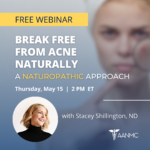 Dr. JoAnn Yanez, AANMC Executive Director, joins KCAA’s NBC LA affiliate On the Brink to discuss allergies and how to support your body during allergy season.
Dr. JoAnn Yanez, AANMC Executive Director, joins KCAA’s NBC LA affiliate On the Brink to discuss allergies and how to support your body during allergy season.
Full Transcript of Interview Below.
Topics Include:
- What causes reactions to allergies
- Tips on how to decrease the effect of allergies on your body
Erin Brinker:
Welcome back. I’m Erin Brinker.
Todd Brinker:
And I’m Todd Brinker.
Erin Brinker:
We are On the Brink, the morning show on KCAA, and I am super excited to welcome to the show Dr. JoAnn Yanez. She is the Executive Director of the Association of Accredited Naturopathic Medical Colleges and the past Chair of the Academic Collaborative for Integrative Health. She also serves on the Integrative Health Policy Consortium Education Committee.
Erin Brinker:
Weaving a passion for illness prevention into her professional life, Dr. Yanez’s career has spanned advocacy, academia, patient care, and public health. She joins us once a month to talk about health from an integrative medicine perspective. Dr. Yanez, welcome to the show.
Dr. JoAnn Yanez:
Good morning. How are you both doing?
Erin Brinker:
Alive, alert, awake, and enthusiastic, but my allergies are off the hook this season.
Dr. JoAnn Yanez:
Well, we just had an allergy webinar yesterday, and this is definitely on a lot of people’s minds. The pollen is crazy this year. My husband and I went for a walk last night and I swear, I probably sneezed eight times in a row.
Erin Brinker:
So what do you do to calm your body’s immune system down? Because that’s essentially what’s happening, right?
Dr. JoAnn Yanez:
Yes. It’s an exaggerated response of the immune system to things in our environment. And so, there are a number of things that you can do that are environmental first. One of those is just making sure that you are limiting your exposure. Things in your home, a lot of times we don’t think of our home as being a harbinger of allergens, but it actually can be. We have such good insulation now that things that get in the home tend to stay in the home.
Dr. JoAnn Yanez:
Also, things like rugs and drapes and carpet and overstuffed furniture, upholstered furniture, can be amazing collectors of dust and pollen. And so, cleaning them regularly. We tend to recommend for folks that are very allergic not to have carpet in their homes, not to have lots of rugs and things that will collect dust and make it harder to clean. Having air filters like HEPA filters, especially in the bedroom and in any areas where you’re spending a lot of time.
Dr. JoAnn Yanez:
Avoiding things like perfumes and scented candles and room sprays and air fresheners and other things that will put additional aerosolized volatile chemicals into the air. Making sure your whole home doesn’t have mold and you’re cleaning regularly. Things like allergy resistant pillows and covers for your mattress. And even washing your sheets regularly.
Dr. JoAnn Yanez:
We’ve started, especially in allergy season now, to have a practice where our outside clothes don’t go on the bed. If I’ve been outside, if I’ve been in the garden, if I’ve been doing anything like that, I personally will take a shower, wash my face, wash my nose, et cetera, and not take those clothes that were outside collecting pollen and then go lay down.
Erin Brinker:
Interesting. I had never thought about that, but that makes sense.
Dr. JoAnn Yanez:
Yes There are supplements and there are things that can help stabilize the immune system a bit. It’s called mast cell stabilization. There are things like quercetin that gets a lot of press. It’s really abundant in polyphenols. They occur naturally in things like onions and capers and berries and so on. Polyphenols can also be found in tea. That can help in some folks with allergies.
Dr. JoAnn Yanez:
There’s an herb called stinging nettle that’s very popular. There’s been some research, further studies are always really nice to have in a lot of these, but herbs like nettles are very commonly used in allergy treatment. Different types of supplementation can help as well. Balancing the gut microbiome, making sure that your body’s immune system is functioning as optimally as possible.
Dr. JoAnn Yanez:
And then diet. Any things that you may be sensitive to, that you might be able to handle and lower quantities. When your body is overloaded with managing the big pollen storms that we’re getting, that can be helpful to just minimize any of those common allergy foods for folks. And they’ve seen people with family histories of allergies, there is definitely a predisposition for allergic manifestation when you’ve got family history.
Erin Brinker:
I’m thinking about carpet and soft upholstery, soft surfaces. Our carpet’s probably 15 years old and it needs to go. We started out before we got on the air, me talking about I feel like I have cotton balls in my head. I think the carpet is the culprit and we’re going to be doing some renovation this summer.
Dr. JoAnn Yanez:
I hear it in your voice. I can hear it. There’s a change in your voice from normal, from normal Erin. Carpet is tricky. A lot of homes come with carpet. It’s more affordable than putting down a tile or wood. And a lot of people just like the soft, squishy feel of it under their feet. Number one, carpet is usually chemically treated. So when it’s first installed, there’s an off-gassing, there’s a smell. We always tell patients, tell folks, open up windows, maybe run an air purifier really high for a while when no humans are in there to try and process out some of the factory chemicals that are included.
Dr. JoAnn Yanez:
But then over time, like you said, 15 years, imagine all of the animal dander and the human skin cells, and all the dust that’s accumulated. You can only wash so much. You can’t stick it in a washing machine. And so, how much gets stuck in the foam? How much gets trampled on and brought back up again? It’s definitely tricky to keep it clean.
Erin Brinker:
Yes, and dogs and cats and kids, you can’t clean it enough. And so, we just got busy and we weren’t thinking, and we’re looking at it going, “Wow, that looks terrible. We’re going to be replacing it this summer.” Beyond the environment, I think about all these beautiful orange blossoms that we have and all the other outdoor pollens. In some areas it looks like there’s somebody sprinkling something. And they are like. Pollen’s everywhere. You can see it blowing in the wind. What’s the best way to kind of help keep yourself, not allergy free, but just make it manageable in this kind of environment?
Dr. JoAnn Yanez:
When it’s that dense outside, and it really is, in my streets, you see a little layer of yellow on the ground. It’s really intense, and you can tell when the trees are blooming and shedding their pollen. For folks that are really, really sensitive, staying indoors a bit more than normal. As tempting as it is right now with the weather getting nice, not having your windows open and kind of keeping the air filters running.
Dr. JoAnn Yanez:
Some folks, one of the maybe unintended benefits of COVID and people wearing masks is some people with allergies when they’ve been wearing the high filtration mask have found that they might not experience their allergies quite as badly. But just making sure, like I said, when you come back inside, wash yourself up, nasal lavage. Things like neti pots can be helpful to just rinse out that pollen out of your nose and eyes. Take a shower. If you’ve got longer hair, wash your hair, just remembering that any of those places on your body are going to retain that pollen. And so, getting it off of you as quickly as you can, can be helpful for some.
Erin Brinker:
I have not used my neti pot this season and actually probably should go get a new one just because it will be sterile. But those things, they’re a little uncomfortable when you first use them, but they really do help.
Dr. JoAnn Yanez:
Well, you can stick it in a pot of boiling water if it’s all made of ceramic and sterilize it that way [crosstalk 00:08:52]-
Erin Brinker:
It’s actually plastic.
Dr. JoAnn Yanez:
Oh, it’s plastic.
Erin Brinker:
It was cheap. It was my first one.
Dr. JoAnn Yanez:
Gotcha. The other thing with neti pots that people just need to be aware of is to use filtered, distilled clean water, not tap water because you are putting it up into your mucous membranes. And so, you want to make sure that you’re using distilled water. Some people find it more comfortable to put some saltwater in there so the pH is a bit more similar to your body’s pH.
Erin Brinker:
Very good, very good. So where can people watch the webinar that you had yesterday?
Dr. JoAnn Yanez:
It is up on our events website. So if you go to the aanmc.org website and you click on events, we have a whole dropdown of all of our past event recordings. It’ll be the most recent one. https://aanmc.org/events/asthma-allergies-and-naturopathic-medicine/
Erin Brinker:
Well, Dr. JoAnn Yanez, it’s always a treat to have you on the air. Thank you so much for joining us today.
Dr. JoAnn Yanez:
You’re welcome. Have a great day, folks. And hope that your allergies get better.
Erin Brinker:
Thank you. I appreciate that. And yours too. So with that, it is time for a break. I’m Erin Brinker.
Todd Brinker:
I’m Todd Brinker.
Erin Brinker:
And we are On the Brink, the morning show on KCAA. We’ll be right back.






